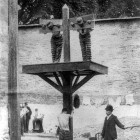
Incarcerated Louisiana Youth Overmedicated into Submission, Investigation Finds
|
Strong antipsychotic medications are being prescribed to incarcerated juveniles across Louisiana despite lacking diagnoses for the conditions they were designed to treat, according to an investigative report by New Orlean’s The Lens. The medications are meant to help with bipolar disorder and schizophrenia. After examining their records, The Lens found 22 percent of medications prescribed in eight Louisiana facilities were designed to treat bipolar disorder. But, only five percent of diagnoses were of bipolar, the investigative news site found. No diagnoses of schizophrenia were made. The most common diagnosis (found in 20 percent of incarcerated juveniles) was “conduct disorder.



